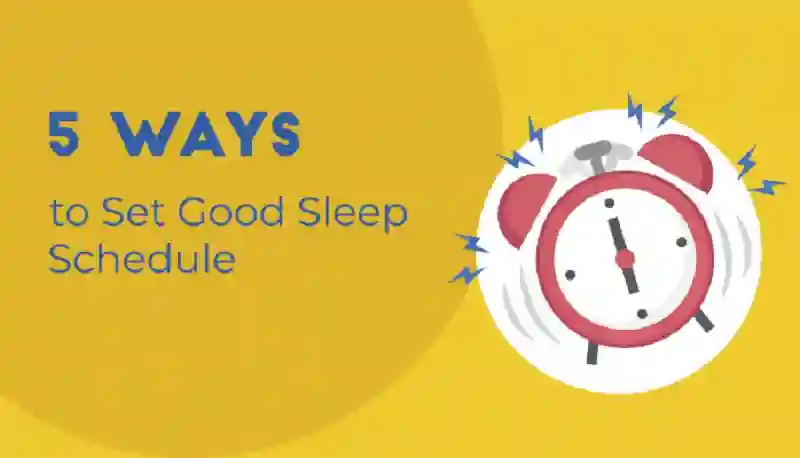
5 Benefits of Maintaining a Healthy Sleep Schedule
Sleep is often treated as a passive, indulgent luxury for those of us who are busy. However, sleep is a critical biological need. Experts recommend scheduling at least seven hours of sleep a night for adults. Adolescents should sleep up to nine hours per night since they are growing.
Sleep provides necessary daily downtime. It also restores and regenerates your body. Insufficient sleep causes many physical illnesses, such as heart disease, stroke, and obesity. Sleep deprivation also causes mental and emotional disorders like dementia. So, as you can see, you must make enough time to get adequate rest each night.
Here are five significant benefits of maintaining a healthy sleep schedule:
1. Increased Physical Fitness
Sleep is as essential to physical wellness as exercise and proper diet. It’s necessary for maintaining a healthy weight, getting fit, and pursuing athletic goals.
While sleeping, your hormones are regulated, muscle is repaired, and the body rests. Sufficient sleep is essential for good health, strength, stamina, and injury prevention.
You may work out regularly. Getting enough sleep is vital for anyone engaged in fitness training or strenuous physical activity.
2. Improved Mental Function
Sleep improves memory, judgment, attention, and overall cognition. It also enhances the ability of the brain to grow, organize, and create neural pathways.
When nightly sleep falls to five hours or less, there are adverse effects within a few days. Learning, reasoning, accuracy, responsiveness, and the ability to multi-task becomes more challenging. Not resting enough can put you in harm’s way when driving and taking care of others.
Sufficient sleep is essential to sharp thinking and peak mental performance. You may have ongoing competitions and participate in a sport that requires concentration. If that’s the case, having enough rest is vital.
If you begin to feel the effects of a lack of sleep, rectify that. Taking steps to overcome sleep deprivation is essential before it affects your mental health.
3. Better Emotional Management
Quality sleep helps you feel energized, motivated, and ready to face the day. It also leads to improved feelings of resilience, joy, and satisfaction. Regular sleep also increases your capacity for managing problems and reducing stress. Conversely, lack of sleep leads to poor performance and frustration. This causes anxiety, depression, irritability, and higher levels of distress.
When depression sets in, it can be hard to feel better right away. There are antidepressants and psychotherapy, but sleep is an easy way to reduce these symptoms.
Furthermore, using marijuana can aid in your ability to fall asleep more easily. Plus, it can help you feel better emotionally by relaxing you. After using cannabis for a while, you may need to reset your tolerance. HIBEGONE details how to reap the rewards of cannabis by resetting your tolerance.
4. Cardiovascular Health
Sleep is also critical for maintaining cardiovascular health. Sleep lowers blood pressure, slows heart rate, reduces stress, and gives the heart time to rest and recover. Sleep also helps regulate insulin levels to prevent the onset of type 2 diabetes. Both stress and diabetes increase the risk of heart disease. Fortunately, you can treat both conditions by increasing your amount of sleep. Alternatively, ignoring sleep elevates blood pressure and increases the risk of heart attack, disease, and failure.
5. Immune Support
Sleep is critical when the body develops, heals, and detoxifies. For example, the body produces vital chemicals such as growth hormones during sleep. Growth hormone supports growth and development in adolescents. And it repairs tissues and cells in adults.
Sleep also produces cytokines, which help the immune system fight infections. Conversely, chronic lack of sleep leads to immunodeficiency. This increases vulnerability to common illnesses such as colds. And it can lead to severe diseases.
Finally, sleep detoxifies the body and removes harmful toxins. If you tend to have health problems, getting enough sleep is vital to feeling your best.
Schedule Your Sleep
Sleep supports your body’s most crucial health and regenerative functions. But, insufficient sleep disrupts these critical processes. These vital “housekeeping” operations need time to mend your body so you wake up fresh and energized. It’s tempting to sleep for only five hours to have more time to do things during the day. But you should use these hours on something other than dull, ineffective, and sedentary activity. Then, you’ll feel your best when taking on life’s challenges and special moments.
Sleeping seven hours, working, and living effectively for seventeen is best. In other words, quality, uninterrupted, and regular sleep is a priority, not an option. So include seven to eight hours of nightly sleep in your schedule to stay happy, healthy, and well-rested.